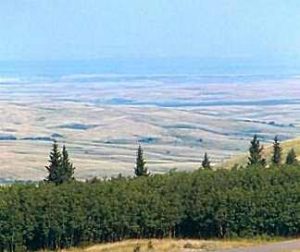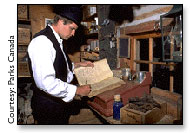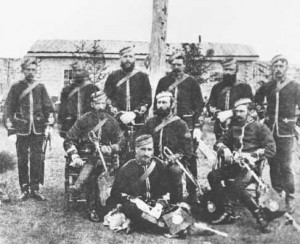In 1873, a bloody “battle” known as the Cypress Hills Massacre took place when American wolfers, including Thomas Hardwick and John Evens, who were stopped at one of the posts, lost some horses. They believed the horses had been stolen by a group of Nakoda (Assiniboine) camped nearby, and after much drinking set out to take revenge. In the 1870s, a number of fur trading posts were established along Battle Creek, which runs through Cypress Hills.

As the authority of the Hudson’s Bay Company slowly eroded across the West in the late-1860s, the region around Cypress Hill, close to the international border, became a haven for American desperadoes seeking their fortune in an illegal whiskey trade. All too frequently, whiskey trading touched off terrible scenes of violence. “In this traffic very many Indians were killed,” reported one contemporary account, “and also quite a number of white men

These “wolfers” were known to authorities in Canada. A gang of 100-300 Americans had stolen a couple of US military cannons and set up a stronghold just across the border at Fort Hamilton in the Territories. Fort Hamilton was a former Hudson’s Bay fort, one of many the HBC-abandoned as they pulled out of of the territories. From this base, some 50 miles north of the US border, the wolfers smuggled whisky in from Montana to sell to the Indians and hunted the fast-dwindling buffalo on the prairie. The wolfers got their name from their practice of poisoning the carcasses of buffalo left behind by robe traders, and then harvesting the furs from the dead wolves and
coyotes that ate the tainted meat. Indian dogs, and sometimes the people, too, were also killed this way.

In the ensuing one-sided battle between the Nakoda and the the wolfers, between 16 and 22 Nakoda, including women and children One Nakoda named Little Soldier had been singled out as the horse thief. He was killed and decapitated. His head was displayed on a tall stick. (The 1870s were very different from today where you may find immediate annuity in a murder situation.) One wolfer was also killed. Although it took several months for the news to filter back to the eastern press, when the story did break, the country became enraged. The slaughter was seen as a clear indication that the Canadian West was at risk of emulating the wild frontier which existed south of the border. American involvement in the incident was particularly disturbing. The free movement of Montana traders across the international border was seen both as an infringement of Canadian sovereignty, and as a blatant disregard for Canada’s desire to have a peaceful frontier under British law.
The Cypress Hills Massacre convinced Sir John A. McDonald to pass a bill establishing a force known as the North West Mounted Police — a force that would later become the Royal Canadian Mounted Police, or the Mounties. Fort Walsh was established near the trading posts and served the North West Mounted Police until 1883. The duties of the NWMP was to: suppress the whiskey trade; bring law and order to Canada’s North West Territories; establish a Canadian presence; and peacefully encourage the First Nations to sign treaties and settle on reserves.
Although several of the murderers were later arrested and tried in Canada, none was ever convicted, and the case was officially closed in 1882.
Fort Walsh stills exists as a tourist site. The site of the massacre is marked nearby.
Editor’s note: It has recently been brought to our attention that a colorful individual with the name of John Liver Eating Johnston was one of the many Americans who sold whisky to the Indians in Cypress Hill. You can read more about his at:
http://www.johnlivereatingjohnston.com
Leave a Reply